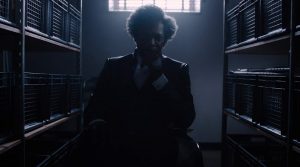![]()
In recent years, we’ve become accustomed to a deluge of superhero films from the likes of Marvel and DC. And as such, audiences have developed certain expectations of what they should be seeing in these types of projects. Glass, the latest film from director M. Night Shyamalan, does deal with comic book mythology and features three uniquely gifted and sometimes frightening characters from Unbreakable and Split coming together.
 Yet, what occurs is likely not what one would expect or imagine given the end of the previous title. In fact, it’s pretty safe to say that many anticipating big thrills and action set-pieces will dislike this feature. The tone is surprisingly downcast and story small and intimate. Frankly, there are a lot of characters at play and several elements don’t always work as well as they should. Yet, despite its flaws, this reviewer found it more unique and specific than many other films of its ilk. Thus, my feeling towards it at the screening I attended wasn’t nearly as negative as many around me.
Yet, what occurs is likely not what one would expect or imagine given the end of the previous title. In fact, it’s pretty safe to say that many anticipating big thrills and action set-pieces will dislike this feature. The tone is surprisingly downcast and story small and intimate. Frankly, there are a lot of characters at play and several elements don’t always work as well as they should. Yet, despite its flaws, this reviewer found it more unique and specific than many other films of its ilk. Thus, my feeling towards it at the screening I attended wasn’t nearly as negative as many around me.
 Set in Philadelphia, the story finds the killer known as the The Beast (James McAvoy) still loose and being hunted down by the older but no-less-unbreakable David Dunn (Bruce Willis). Also in the mix is Mr. Glass (Samuel L. Jackson), now in a constant catatonic state at a local mental institution run by Dr. Ellie Staple (Sarah Paulson). The doctor firmly believes that these men all have severe delusions and has used heavy sedation to placate Mr. Glass. Over the course of the film, the leads all begin to wonder if her thesis is true and there isn’t a more rational explanation for their abilities.
Set in Philadelphia, the story finds the killer known as the The Beast (James McAvoy) still loose and being hunted down by the older but no-less-unbreakable David Dunn (Bruce Willis). Also in the mix is Mr. Glass (Samuel L. Jackson), now in a constant catatonic state at a local mental institution run by Dr. Ellie Staple (Sarah Paulson). The doctor firmly believes that these men all have severe delusions and has used heavy sedation to placate Mr. Glass. Over the course of the film, the leads all begin to wonder if her thesis is true and there isn’t a more rational explanation for their abilities.
 As mentioned, the film is far more of a character study, jumping between each of the three leads and significant others in their lives. Some of it is quite interesting, with The Beast’s previous victim Casey (Anya Taylor-Joy) returning and in the process calming his more sinister urges. McAvoy stands out, with the character’s Dissociative Identity Disorder allowing him to shift between multiple personalities seamlessly, and often within the same shot. Mr. Glass also becomes more prominent as the story progresses, finally allowing Jackson to overtly begin manipulating events with a knowing look.
As mentioned, the film is far more of a character study, jumping between each of the three leads and significant others in their lives. Some of it is quite interesting, with The Beast’s previous victim Casey (Anya Taylor-Joy) returning and in the process calming his more sinister urges. McAvoy stands out, with the character’s Dissociative Identity Disorder allowing him to shift between multiple personalities seamlessly, and often within the same shot. Mr. Glass also becomes more prominent as the story progresses, finally allowing Jackson to overtly begin manipulating events with a knowing look.
 Willis gets a few good moments, although the character isn’t really given proper due at the close. And considering what had preceded it, the climax forces several leads to state some of the themes and intentions in too grandiose a manner. But in doing so, the movie does explicitly explain itself by the end. Expectations will ultimately determine what many will think of this resolution. While it’s understandable that these are flawed characters and the tone shouldn’t be light, there’s an overall glumness to the proceedings that may upset viewers, not to mention what occurs to one of the film’s primary sinister forces.
Willis gets a few good moments, although the character isn’t really given proper due at the close. And considering what had preceded it, the climax forces several leads to state some of the themes and intentions in too grandiose a manner. But in doing so, the movie does explicitly explain itself by the end. Expectations will ultimately determine what many will think of this resolution. While it’s understandable that these are flawed characters and the tone shouldn’t be light, there’s an overall glumness to the proceedings that may upset viewers, not to mention what occurs to one of the film’s primary sinister forces.
Strangely enough, the more eccentric elements that many will dislike are, in a way, what sets it apart from other comic book movies. The movie doesn’t quite match the heights one might have hoped for and doesn’t equal its predecessors, but it certainly isn’t boring and does not take the familiar superhero path (the story wraps itself up resolutely and there are no bonus scenes after the credits roll). As a result, Glass may be a little cracked, but at least the brew within is oddly intriguing.


